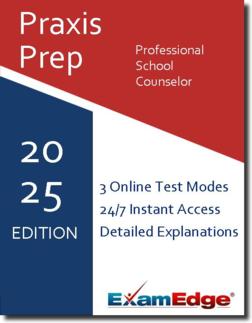Praxis Professional School Counselor (5421) Practice Tests & Test Prep by Exam Edge - Topics
Based on 29 Reviews
- Real Exam Simulation: Timed questions and matching content build comfort for your Praxis Professional School Counselor test day.
- Instant, 24/7 Access: Web-based Praxis Professional School Counselor practice exams with no software needed.
- Clear Explanations: Step-by-step answers and explanations for your Praxis exam to strengthen understanding.
- Boosted Confidence: Reduces anxiety and improves test-taking skills to ace your Praxis Professional School Counselor (5421).

Understanding the exact breakdown of the Praxis Professional School Counselor test will help you know what to expect and how to most effectively prepare. The Praxis Professional School Counselor has 120 multiple-choice questions The exam will be broken down into the sections below:
| Praxis Professional School Counselor Exam Blueprint | ||
|---|---|---|
| Domain Name | % | Number of Questions |
| Foundations | 18% | 22 |
| Delivery of Services | 45% | 54 |
| Management | 15% | 18 |
| Accountability | 22% | 26 |


